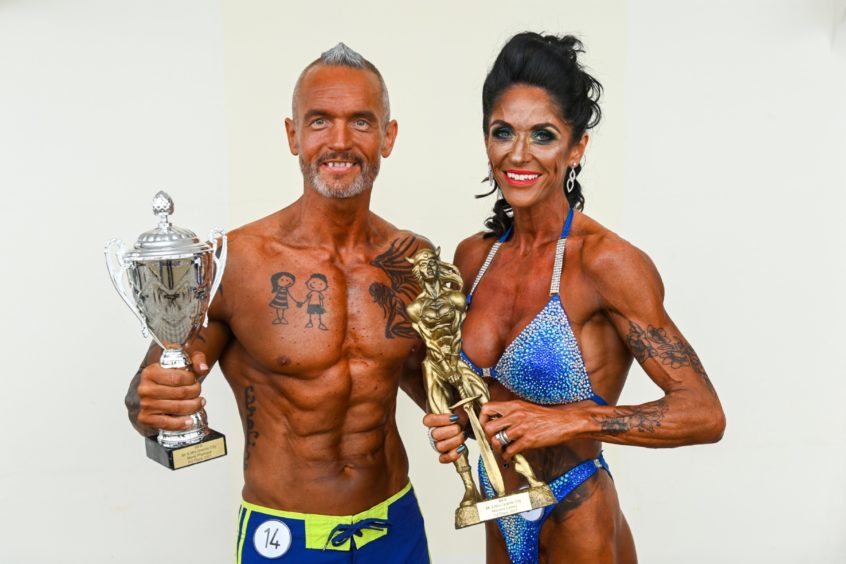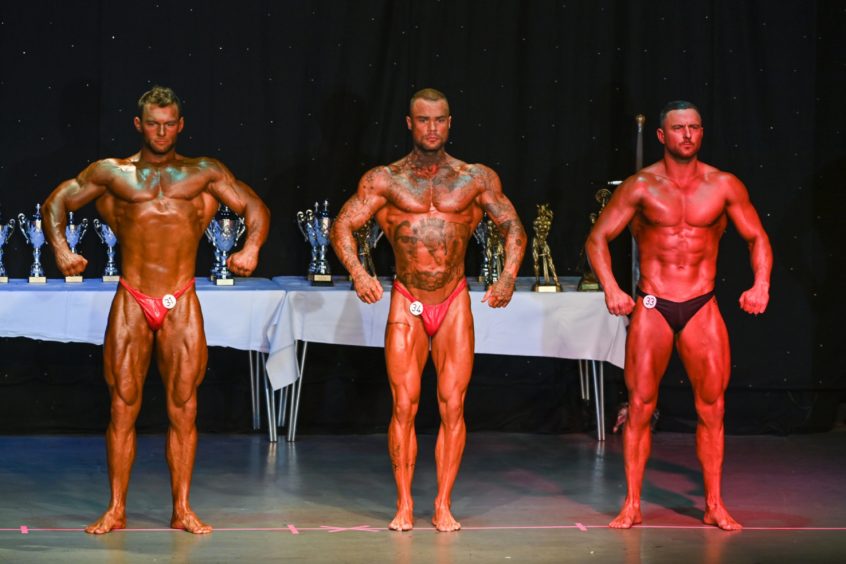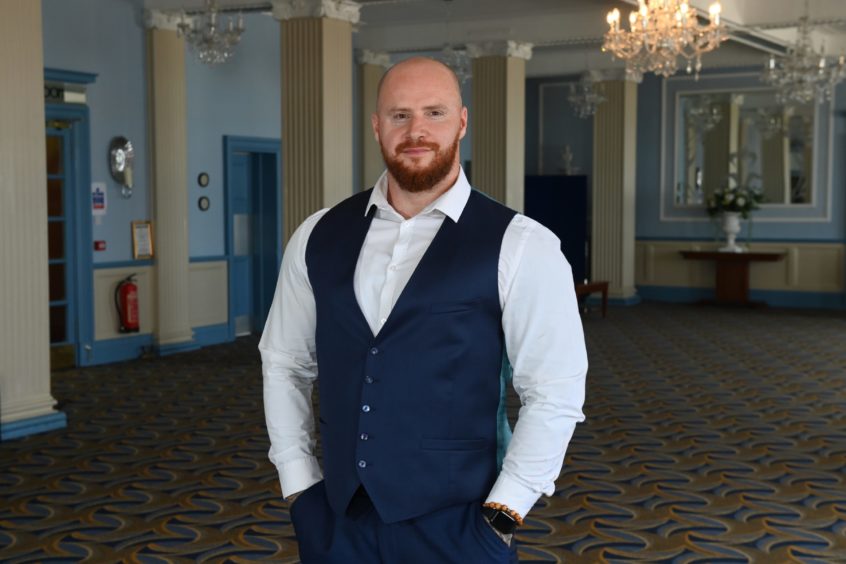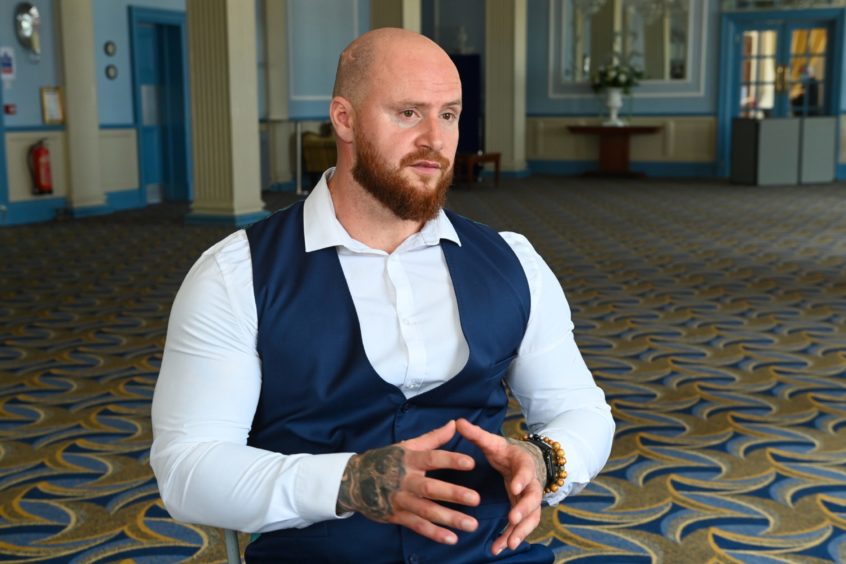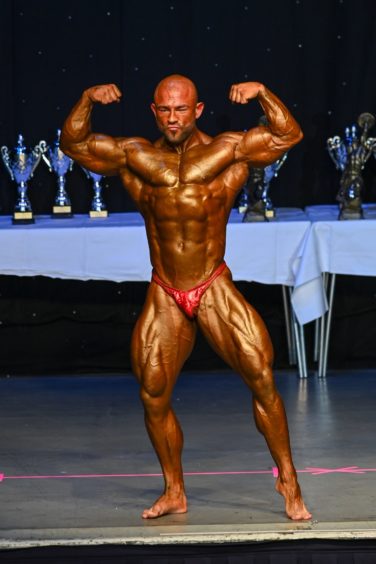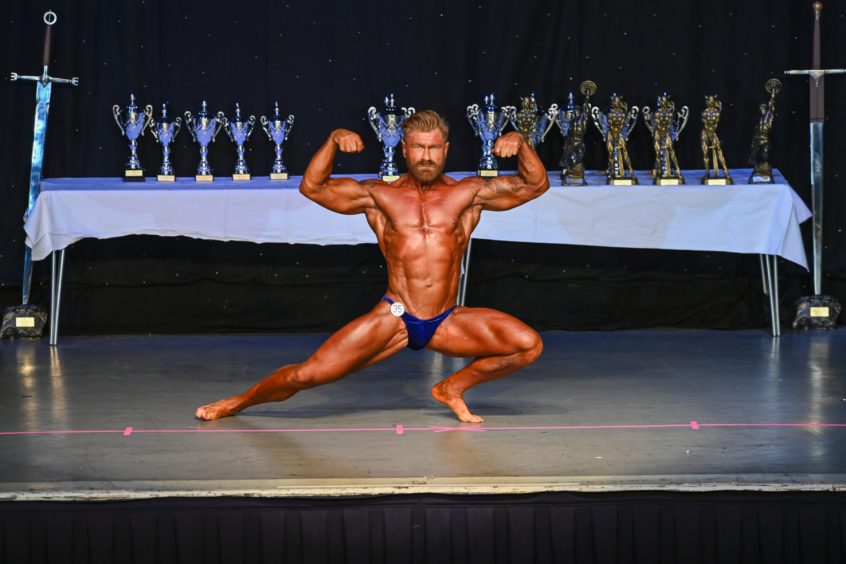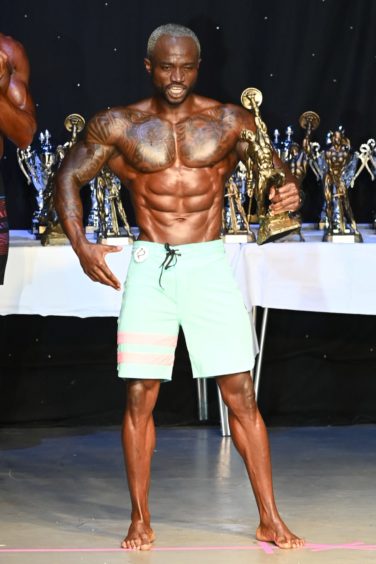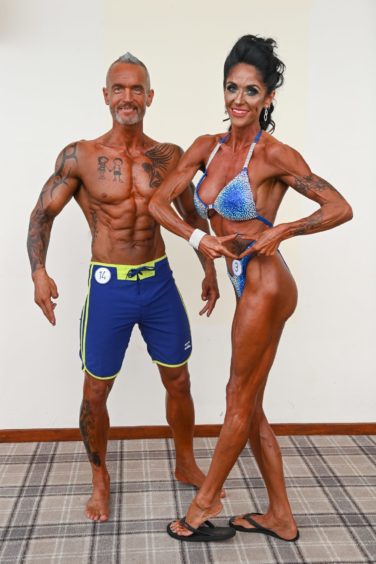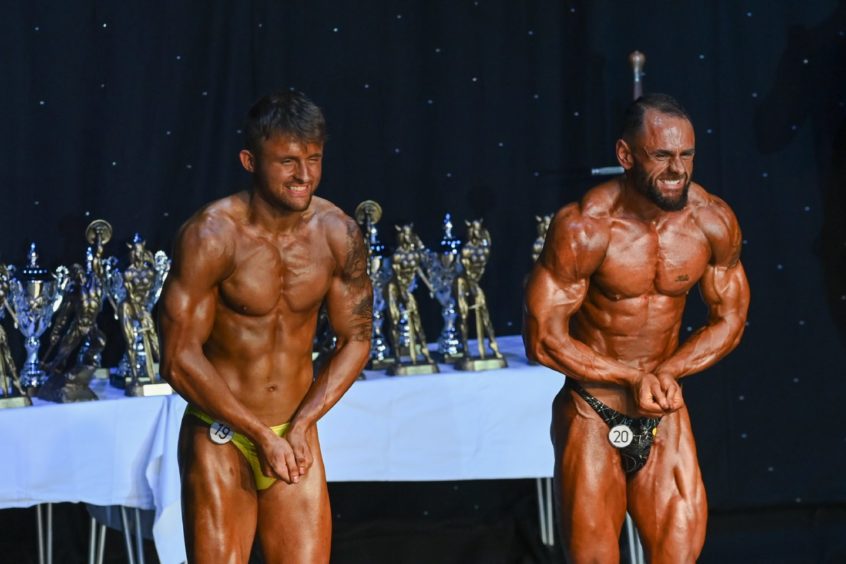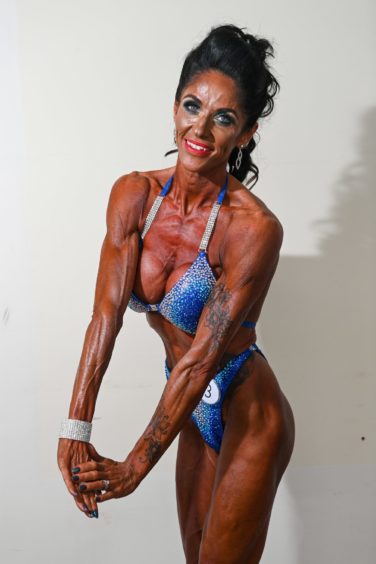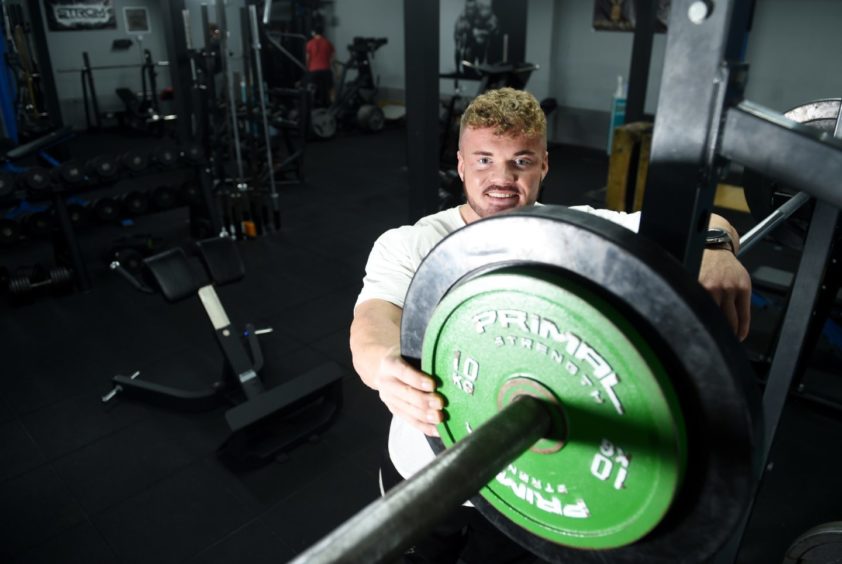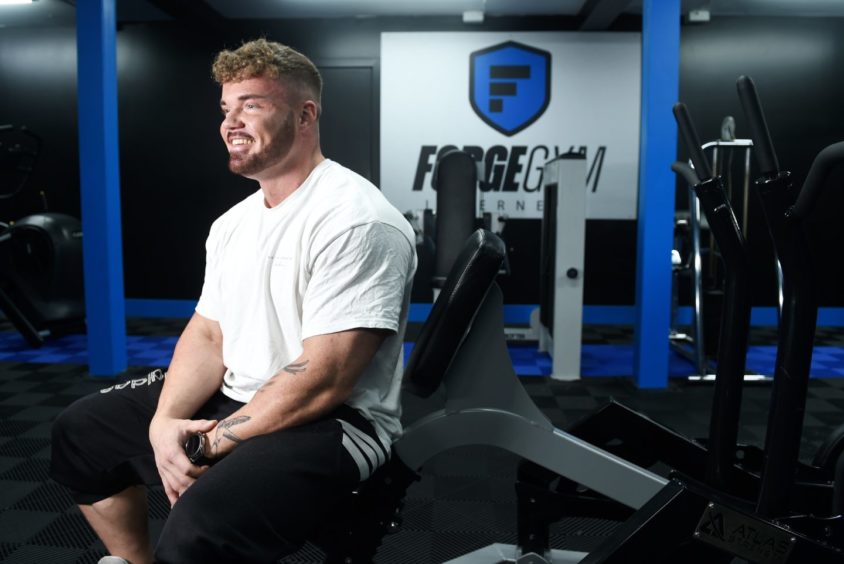Caroline and Stuart Jarret are self-confessed “oldies”.
Both approaching their 50th birthday, the couple are unremarkable – on paper at least.
Caroline, 47, is a care home manager, a role which has been increasingly challenging during the pandemic, while Stuart, 49, is an economist.
Yet the Aberdonian couple standing before me certainly do not represent your average husband and wife team.
Caroline is proudly clutching a trophy, with Stuart not far behind her.
We aren’t at a bowling tournament or tennis match however, and the pair are repeatedly congratulated by fellow scantily clad competitors.
Impossibly muscled limbs contort into a variety of poses, the skin a deep shade of mahogany as beauticians get to work with a tanning mitt.
Caroline and Stuart are no exception, as Caroline unties her satin robe to reveal a dazzling glittery bikini, which seems to be moulded to her lithe frame.
They are both fresh off stage at Aberdeen Beach Ballroom, where hundreds of spectators have finally gathered for the first time in months.
There is an encouraging roar from the audience as more muscled hopefuls take their place, following months of hard work and sacrifice.
This is the Granite City Classic, Aberdeen’s first bodybuilding competition for more than five years.
Originally scheduled to take place last year, competitors have travelled from far and wide in order to be triumphant, be that in Miss Athletic Figure or Master Ladies.
The atmosphere is upbeat, with each athlete performing to their own soundtrack.
Endless hard work, for mere minutes under the spotlight in front of judges and supporters, before the day comes to a close.
But what lies beneath layers of fake tan, unbelievable definition and Speedos which leave very little to the imagination?
If you’re not familiar with bodybuilding, it might seem like an intimidating sport which is yet to find its place in the mainstream.
Aberdeen is actually home to some of the country’s up-and-coming bodybuilders, and many competitors believe the experience has done wonders for both body positivity and mental health.
Your Life went behind the scenes to find out why bodybuilding is not just sequins and steroids.
Rob Rose, founder of Granite City Classic
Looking dapper in a smart suit, which he confesses to have found in T.K.Maxx, there are no airs and graces to be had with organiser, Rob Rose.
The 38-year-old is the brains behind the Granite City Classic, and is determined to change people’s opinion on bodybuilding for good.
The plastic foldaway chair creaks as Rob lowers himself down.
He may not be competing, but Rob’s physique goes a tad beyond average, to boast fierce shoulders and impressive height.
It is difficult to believe that he was once a “skinny” footballer player who found himself on the sidelines due to injury, before exercises to ease back pain lead to a new way of life.
“It was about 14 years ago now, and I played football to a decent level,” says Rob.
“Then I got injured and it was recommended that I strengthen up my lower back.
“I think I took it a bit far.”
That’s one way to cover Rob’s physical transformation and he believes bodybuilding is about so much more than physical appearance.
Although show day itself is very much visual, from the fake tan used to highlight each strand of muscle, to the eye-wateringly expensive outfits, it is the build up itself which requires each and every bodybuilder to dig deep.
There is a hint as to the dedication needed come the interval, as the judging panel tucks into food housed in Tupperware.
Don’t be fooled by the humble ingredients of pasta and tuna however, carefully measured carbs and protein is the aim of the game.
“I always had a passion for team sports, and I’m competitive,” says Rob.
What I loved about bodybuilding and still do – whatever I put into it is what I got out of it. I wasn’t relying on anyone else
“Bodybuilding is a lifestyle if you want to take it to the point of competitive, you can’t dip your toe in it so to speak.”
But what does it take to sculpt a winning physique, and what are the benefits aside from jaw-dropping glances, and of course peak fitness?
“I think I’ve seen massively the positive impact which bodybuilding can have on people’s lives,” says Rob.
“I’ve helped a few people personally. If you are in a physically poor state, it will impact on you mentally.
“Being unhappy in your personal life can be linked to people feeling unhappy in their own skin.
“I’ve seen people who have been told by their GP that they are morbidly obese and the clock is ticking.
“But through hard, hard graft, they’ve turned it around.
The time frame is massive. In 12 months you can turn things around if you really apply himself
“That means meal prep, cardio, resistance training. The difference in wellbeing is immeasurable.”
Rob has juggled the world of bodybuilding with his job as an area security manager, which can see him work long hours.
He was also faced with pulling the plug on the show due the pandemic, before rescheduling only to find that another lockdown came into force.
“We sold the show out before the old Rona (coronavirus) came along,” he recalls.
“We rescheduled when gyms reopened, then it was lockdown again.
“There is more than 500 people at this event, and Mental Health Aberdeen have come along.
“If just one person goes and has a positive chat to them, that’s a huge win.
“It has also been important for local businesses, the independently run gyms of Aberdeen and meal-prep companies.”
Prior to the event, Rob believes there was not a show to represent bodybuilders of the north-east, who found themselves having to travel to compete.
I think the talent in Aberdeen will become more and more apparent as bodybuilding goes mainstream,” says Rob.
“The plan is to make the show an annual event. During lockdown, people became aware of how dependent they were on the gym – even those with a generic membership.
“Even celebrities have started to understand and promote bodybuilding.
“A large portion of the audience are bodybuilding fans and fitness enthusiasts.
“We have people competing from all walks of life. This is not a bunch of big meatheads stood on stage in their pants.
“That’s the stereotype of bodybuilding, when so much skill is involved.
“These people haven’t had a gym to train in, yet they’ve still rocked up on stage.”
Challenging stereotypes
With takeaways and booze out of the question, at least during prep time, why do people push themselves to such extremes?
There’s no simple answer, and bodybuilding is an incredibly personal sport.
“The reason for doing it can be quite individual,” says Rob.
“It could a weight-loss goal, knowing you have to get up on stage in your pants in front of hundreds of people.
“That level of accountability is huge.
“Then there’s having a solid coach, because you almost don’t want to let your coach down.
“You’ve spent a long time building your physique and eating chicken and rice, you want to unveil your work.”
Rob believes it is important to remember that bodybuilders do not exist in a constant state of training, however.
“People need to realise that you’re just a normal person for most of the year,” he says
“Abs are a very good marker. For nine months of the year, my abs aren’t visible and I’m just a very large and uncomfortable man.
“There is the danger, of course, that when you come out of that period of having a huge amount of focus on food, there’s the danger of becoming massively obsessed.
The truth about steroids
The use of anabolic steroids is common knowledge in the industry. They are legal but prescription-only medicines, and are taken to increase muscle mass and improve performance.
But used incorrectly, the drug, which mimics the effect of testosterone, can cause serious side effects and even be addictive.
From aggression to heart problems, steroid use can go hand in hand with muscle dysmorphia
“Steroids can be a problem in that they are like any other drug, of course they have side effects,” says Rob.
“Do I think they are the worst thing? No. But then I am very pro-education.
“There is so much stigma surrounding steroids because of the days of old, or a bunch of lads on holiday in Ibiza deciding to take them, with no clue what they are doing.
“We need to talk about it, be open about it. I’ve got a grand plan to offer seminars with a government anabolic steroid expert called David Crossland.
“I recently had dinner with him. He goes to prisons all over the country, where steroids are widely used.
In bodybuilding, food is the base and training is the stimulus. The icing on the cake is anabolic steroids, that’s the juice
“It’s about managing it, getting your bloodwork done regularly and having a long period off them.
“You can naturally build your physique to a very impressive level; taking steroids is a personal choice.
“There are various federations where you can compete as a natural bodybuilder. We are an untested federation, meaning you can do what you like. All bets are off.”
Husband and wife team
It seems a strange world for an economist and care home manager to inhabit, but Caroline and Stuart Jarret seem very much at home.
It was Stuart who convinced his wife to give bodybuilding a go, and she has now been competing for four years.
“He was always telling me to stop with the sweets and booze and give bodybuilding a go,” says Caroline, who glitters from head to foot in a bikini and glamorous make-up.
“It does take a lot of dedication, and during Covid it was particularly hard. Stuart was dropping my meals off for me at work in Tupperware.
“Some of my friends don’t really understand it, especially when I take my food along and don’t drink.
“But people wrongly think that if you pump weights, you’ll get massive. It takes years to get like that.”
Turning down cocktails in favour of water and an early night doesn’t sound particularly appealing, but the sacrifice has clearly paid off, with Caroline securing first place in her category.
“It can be petrifying going up on on stage, but it passes by really fast,” says Caroline.
“Bodybuilding is a goal, it is something to work towards.”
Husband Stuart agrees, and at 49 he places an impressive third in his category.
“The older you get, it’s the challenge,” he says.
“Most of our pals are gym goers, and we’re really hoping this will become an annual event.”
The next generation of bodybuilders
Bodybuilding clearly unites the generations, with 25-year-old Jack Gunn on the judging panel.
A rising star in the bodybuilding world having won numerous competitions, Jack has been involved since he was just 19 years old.
He juggles the demanding industry with his job as a business change manager, alongside running The Forge Gym in Inverness.
“I really loved the gym, and I was spending around three hours a day there,” says Jack.
“So I thought, well why not have something to show for it. I became close with Graham Park, an ex Mr Universe.
“He took me under his wing and I did my first show when I was 19. This is my first year competing outwith the juniors.”
Jack makes no qualms as to the sacrifices required though.
“Nobody realises, people think it’s just going to the gym,” he says.
“It’s preparing your food, eating all your meals at the right time, your training, rest and hydration. It’s even your sleep.”
“Looking in from the outside, people think I’m crazy. But this is my normal, it becomes habitual.
“Being completely honest, the last six to seven weeks of preparation are hard. You’re run down, fatigued. You’re preserving all the energy you have for the gym.
“But that’s only seven weeks of the year. I’m very competitive, it’s the drive to do better.
“What I do every day is part of the end goal, otherwise it would feel pointless.
“This show is a massive deal for bodybuilding up north; what Rob has done is open the door to the sport for so many people.
“Of course there’s challenges. You’re overloading yourself in every capacity, pushing as many variables as you can.
“But this is my choice, so I think I am promoting body positivity.
“I take comfort in that.”
